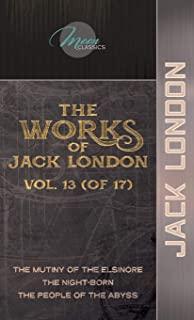
London, Jack
The Mutiny of the Elsinore is a novel by the American writer Jack London first published in 1914. After death of the captain, the crew of a ship split between the two senior surviving mates. During the conflict, the narrator develops as a strong character, rather as in The Sea-Wolf. It also includes some strong right views which were part of London's complex world-view. The novel is partially based on London's voyage around Cape Horn on the Dirigo in 1912.
The character "De Casseres," who espouses nihilistic viewpoints similar to the ideas of French philosopher Jules de Gaultier, is based on London's real-life friend and journalist Benjamin De Casseres.
The People of the Abyss (1903) is a book by Jack London about life in the East End of London in 1902. He wrote this first-hand account after living in the East End (including the Whitechapel District) for several weeks, sometimes staying in workhouses or sleeping on the streets. In his attempt to understand the working-class of this deprived area of London the author stayed as a lodger with a poor family. The conditions he experienced and wrote about were the same as those endured by an estimated 500,000 of the contemporary London poor. London also used the expression "the people of the abyss" in his later dystopian novel The Iron Heel (1907).







